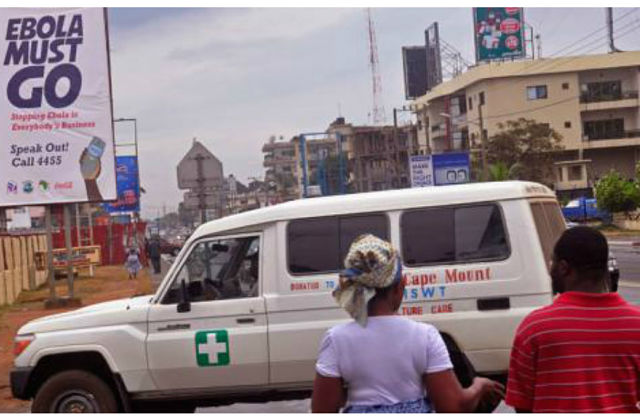 Ambulance drives through the city of Monrovia, Liberia. (AP photo)
Ambulance drives through the city of Monrovia, Liberia. (AP photo)
Press Release
U.S. Department of State
The State Department’s Deputy Coordinator for Ebola Response Andrew Weber recently spoke, via conference call, with members of the U.S.- African diaspora community to discuss progress in the international Ebola response and the transition to the next phase of U.S. efforts. The call was a fourth in a series of conference calls hosted by the Bureau of Public Affairs with African diaspora members about the international response to the Ebola crisis.
Mr. Weber opened the call by highlighting important milestones that have been reached in our response to the epidemic. After approximately 10 months since the first U.S. personnel deployed to West Africa to fight Ebola, the vast majority of the U.S. troops assigned to combat the Ebola outbreak in West Africa will return home by April 2015. Having completed their mission, only 100 will remain deployed in West Africa.
While U.S. troops are coming home, Mr. Weber emphasized that the United States is not leaving West Africa. In keeping with President Obama’s charge that we tackle Ebola as a national security priority, the United States will continue to be a leader in the international response we helped to build to fight the disease at its source. More than 10,000 U.S.-supported civilian responders will remain on the ground in West Africa to fight the disease.
The transition represents a shift from an emergency military response to a more conventional and sustainable civilian-led effort in concert with our African partners. Mr. Weber outlined the next phase in our Ebola response which will include sustained, targeted involvement as we work to achieve zero cases in West Africa, while building the capacity within the region to prevent, detect and respond to future outbreaks before they become epidemics.
Expressing their appreciation to the U.S. Government for its leadership in responding to the Ebola crisis and for its continued engagement of the community, diaspora representatives were eager to discuss how the community can continue to assist in this next phase of our Ebola response. Recognizing the current efforts of diaspora groups and the resources that they have devoted to help their communities of origin to end the crisis, Karen Richardson, a representative from the Bureau of Public Affairs who also joined the call, noted the critical role the diaspora has played since the outset of this crisis.
While we have succeeded in controlling the exponential growth of the disease, getting to zero cases will require a sustained and targeted international response. Mr. Weber underscored that the fight is far from over and that we remain committed to achieving an Ebola-free West Africa.
—
About the Author:
David Duckenfield serves as Deputy Assistant Secretary of State in the Bureau of Public Affairs.
For more information on the ongoing U.S. response to the virus, please visit the State Department’s Ebola Response webpage.
Join the conversation on Twitter and Facebook.

























